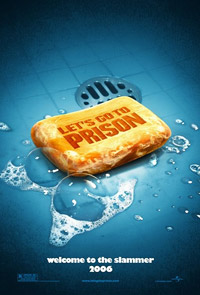Plot
After serving three prison sentences, repeat offender John Lyshitski plots revenge on Judge Nelson Biederman III, a tough judge who presided over each of his trials, passing him stiff sentences. John calls the courthouse to determine when he will next preside over a case, only to discover that he died three days before John's release.
John turns his attention to the late judge's obnoxious son, Nelson Biederman IV. At a dedication ceremony for Judge Biederman, he breaks into Nelson's car, emptying his emergency inhaler. After the ceremony, John stalks Nelson in his van; a hyperventilating Nelson frantically searches through a pharmacy's shelves for a new inhaler, with his erratic behavior making the owners think he is a junkie and mistake him for a violent robber. The police arrive and arrest Nelson. John is ecstatic that Nelson has landed in the criminal justice system which he suffered in for so long at the hands of Nelson's father.
Charged with felony assault, Nelson demands that the Biederman Foundation get him acquitted. The board nearly complies, before deciding to purposely provide Nelson with a grossly incompetent defense team at the trial. The incompetent jury find Nelson guilty and he is sentenced to three to five years in state prison. John, not satisfied with Nelson merely going to prison, decides to get himself arrested by purposely selling narcotics to undercover cops, despite seeing through the Cheech & Chong ruse. At his trial before the same judge Nelson had, John pleads guilty and convinces her he be sentenced to three to five years in the same prison as Nelson.
John bribes a prison guard to become Nelson's cellmate, pretends to be his friend, and gives Nelson terrible advice on surviving in prison. Despite being an unhardened and inexperienced prisoner, Nelson gets himself out of the many situations that John's misinformation creates. He meets G-Lords leader Barry, an imposing, brawny gay man who coerces him into a relationship. Despite his intimidating appearance, Barry is a sensitive romantic, supplying potential romantic partners with his finest toilet-made Merlot.
Nelson angers White Kingdom leader Lynard by ratting him out on a prison shanking, who vows to kill him after being thrown in the hole. After Lynard is released, Nelson acquires a syringe containing deadly chemicals to commit suicide; before he can do so, Lynard attacks him in his cell. The syringe falls out of Nelson's pocket, Lynard assumes it is narcotics and injects himself, accidentally killing himself, and Nelson earns the respect of and authority over the White Kingdom.
Nelson reaches his one-year parole hearing relatively unharmed, and as the new leader of the white supremacist gang for "killing" Lynard. Nelson, who initially submits to being Barry's partner out of fear, grows to care for him, willingly playing along with the "relationship" to keep him happy. Nelson also protects Barry from Lynard's former cronies, who are now loyal to him.
Frustrated with Nelson's newfound respect, John drugs Nelson and tattoos "white power" onto his forehead along with other Nazi emblems to sabotage his parole hearing. Nelson's parole is denied and the board recommends he serves the full sentence. Enraged, Nelson confronts John, who confesses to framing Nelson, making it clear it was his father who made John the man he was, and they fight. Guards intervene and set up a death match between the two prisoners.
When the fight comes, John and Nelson inject each other with a coma-inducing drug. The guards and prisoners believe they are dead and bury them. Just before the death match, Nelson had legally adopted Barry, who has been paroled, so he retakes control of the Biederman Foundation. Barry uses the Biederman Foundation's funds to bribe the mortician to skip the autopsy and later digs up John and Nelson after the "funeral". John, Nelson and Barry begin a new chapter of life, starting a winery (the product is "toilet wine").
Reception
On the review aggregator website Rotten Tomatoes , 13% of 40 critics' reviews are positive, with an average rating of 3.3/10.The website's consensus reads: "Let's Go to Prison is guilty on all counts of cliched setups, base humor, and failure to ellicit laughs." [5] Metacritic , which uses a weighted average , assigned the film a score of 27 out of 100, based on 13 critics, indicating "generally unfavorable" reviews. [6]
Dennis Harvey of Variety wrote: "Unlike the vast majority of rude big screen comedies these days, Prison may actually improve with repeat viewings, since its best aspects are offhand enough to be missed the first time around." [7] Frank Scheck of The Hollywood Reporter did not find the film funny, and wrote: "The few laughs this purported comedy contains are fully displayed in its far more amusing trailer". [8]
Box Office Mojo reports that the film opened in eleventh place with a gross of $2,220,050. It closed with a domestic gross of $4,630,045. [9]
The film has been considered a cult classic after its multiple broadcasts on Comedy Central.
